牛津深圳版英语七年级上册 Unit 8 Collecting things 课时1 词汇课件(共21张PPT)
文档属性
| 名称 | 牛津深圳版英语七年级上册 Unit 8 Collecting things 课时1 词汇课件(共21张PPT) | 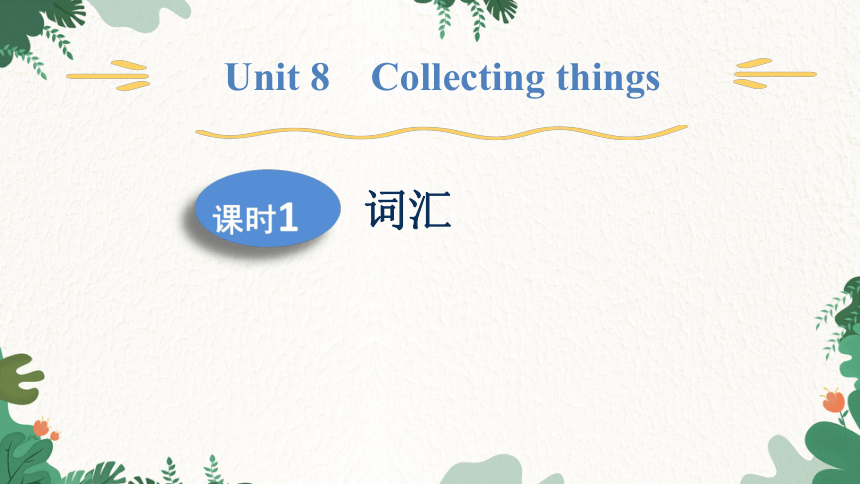 | |
| 格式 | pptx | ||
| 文件大小 | 2.2MB | ||
| 资源类型 | 教案 | ||
| 版本资源 | 牛津深圳版 | ||
| 科目 | 英语 | ||
| 更新时间 | 2023-07-21 16:26:41 | ||
图片预览

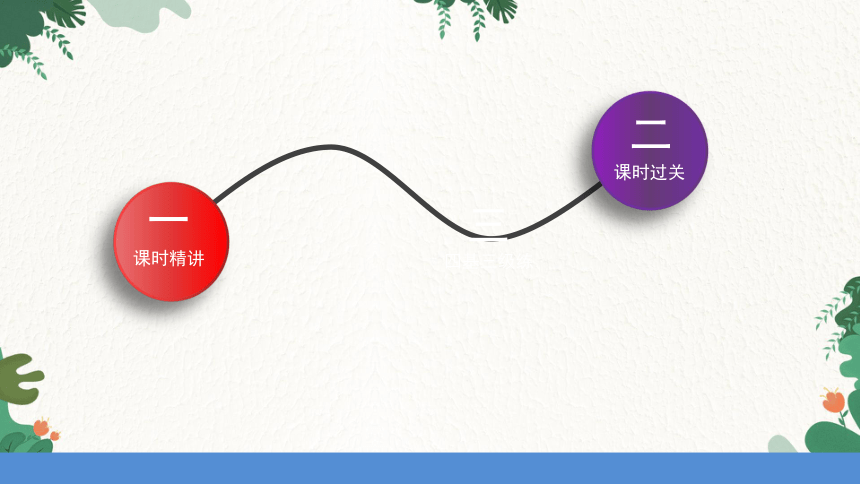
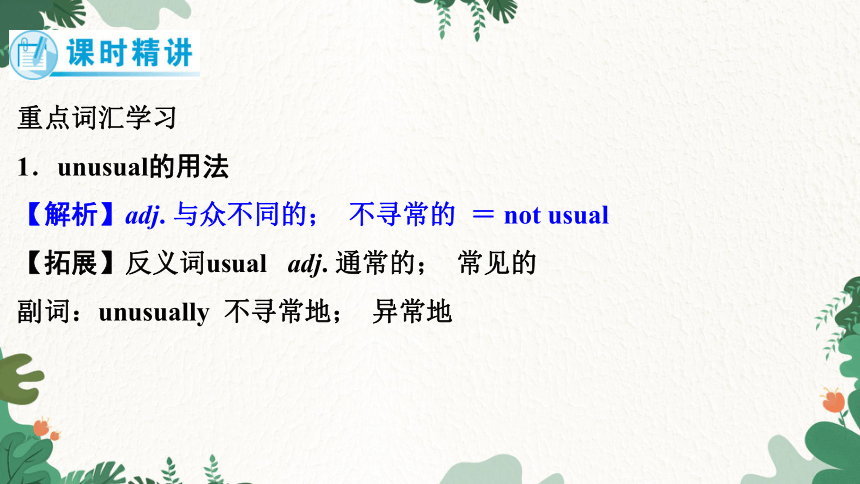

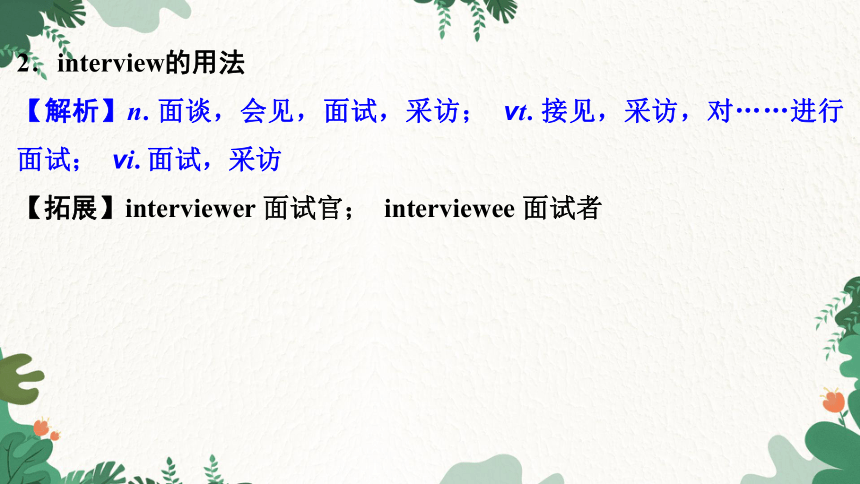
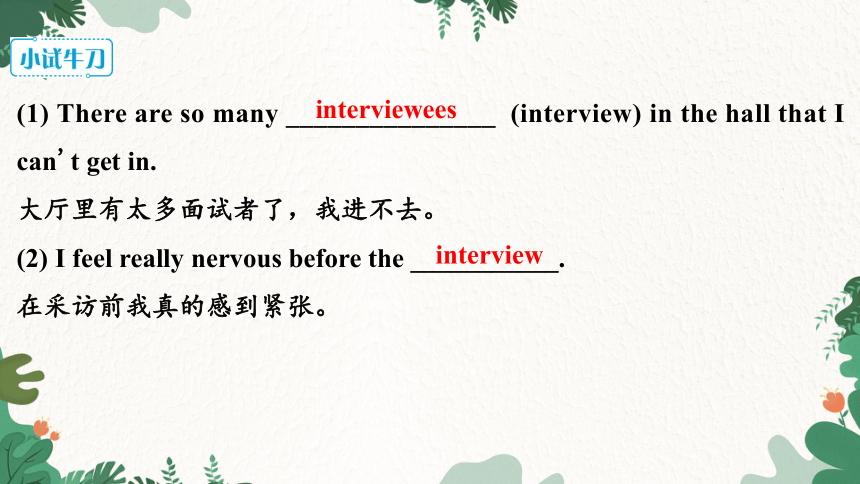


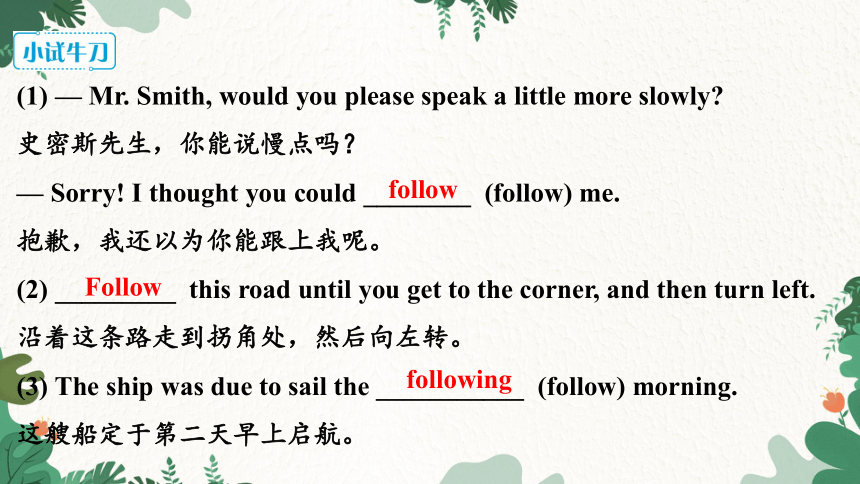
文档简介
(共21张PPT)
Unit 8 Collecting things
课时1
词汇
一
课时精讲
三
四基三级练
二
课时过关
重点词汇学习
1.unusual的用法
【解析】adj. 与众不同的; 不寻常的 = not usual
【拓展】反义词usual adj. 通常的; 常见的
副词:unusually 不寻常地; 异常地
( ) — Is there in today's newspaper?
— No, there's .
A.anything special; something unusual
B.anything special; nothing unusual
C.special anything; nothing unusual
B
2.interview的用法
【解析】n. 面谈,会见,面试,采访; vt. 接见,采访,对……进行面试; vi. 面试,采访
【拓展】interviewer 面试官; interviewee 面试者
(1) There are so many _______________ (interview) in the hall that I can't get in.
大厅里有太多面试者了,我进不去。
(2) I feel really nervous before the ___________.
在采访前我真的感到紧张。
interviewees
interview
3.push的用法
【解析】v. 推; 揿; 摁; 催促 近义词:press
(1) You may stop the machine by _________ (push) this button.
按下这个按钮你就可以关掉这个机器。
(2) He _________________ her into making a decision.
他催促她做出决定。
pushing
pushes/pushed
4.follow的用法
【解析】v. 跟随 (= go/come after); 沿着
【拓展】following adj. 接着的; 下列的 = next
prep. 在……以后; n. 追随者; 下列人员;下列事物
(1) — Mr. Smith, would you please speak a little more slowly
史密斯先生,你能说慢点吗?
— Sorry! I thought you could ________ (follow) me.
抱歉,我还以为你能跟上我呢。
(2) _________ this road until you get to the corner, and then turn left.
沿着这条路走到拐角处,然后向左转。
(3) The ship was due to sail the ___________ (follow) morning.
这艘船定于第二天早上启航。
follow
Follow
following
5.hardly与hard的区别:
【解析】hardly adv. 几乎不; 几乎没有
hard adj. 硬的; 困难的; 勤奋的; 用力的 adv. 努力地; 强烈地; 严重地; 坚定地
(1) ( ) — Linda, pass my glasses to me, please. I can read the words in the newspaper.
— With pleasure.
A.hardly
B.nearly
C.clearly
A
(2) ( ) — Remember, class. you work, result you will get.
— We know, Miss Wang.
A.The better; the harder
B.The harder; the better
C.The hard; the better
(3) If you don't work ______ (hard),you can ________ (hard) pass the exam.
B
hard
hardly
6.everything, something, anything与nothing等不定代词的用法
★everything,something,anything,nothing 均为指物的复合不定代词,它们作主语时,谓语动词常用单数形式。虽说构成出自一家,但它们的用法是有区别的:
(1)everything 意为“每件事,一切事”; 可用于肯定句、疑问句或否定句中。如:
I hope everything goes well. 我希望一切顺利。
Who can know everything 谁能知道万事万物呢?
(2)something 意为“某事,某物”; 常用于肯定句中,也可用于征求对方意见的疑问句中。如:
Something is wrong with my ears.
我的耳朵有点毛病。
Jim, could you do something for me, please
吉姆,请为我做点事好吗?
(3)anything 意为“某事,任何事”; 一般用于否定句、疑问句或条件句中。anything 意为“无论什么东西,随便什么事情”,用于肯定句。如:
Can you hear anything
你能听到某种声音吗?
You mustn't eat anything until you see the doctor.
在看医生之前你不许吃任何东西。
You can take anything you like.
你喜欢什么随便拿。
(4)nothing 意为“没有什么,没有东西”。如:
Tom saw nothing. 汤姆什么也没看见。
( ) — Do you have to tell me
— No, nothing.
A.anything special
B.special anything
C.special something
A
一、按要求写出下列单词的相应形式。
1.unusual (反义词) _______
2.interview (指人的名词) ___________________________
3.model (复数) ________
4.sentence (复数) ___________
5.collect (名词) _______________________
usual
interviewer/interviewee
models
sentences
collection/collector
6.hardly (形容词) ______
7.really (形容词) ______
8.they (形容词性物主代词) _______
9.inside (反义词) _________
10. free (反义词) ______
hard
real
their
outside
busy
二、用所给实词的适当形式填空或填入恰当的虚词完成句子。
1.This is my ______________ (collect) of stamps.
2.He is very interested in __________ (swim) in his free time.
3.He thinks playing computer games is _______ waste of time.
4.Mom, do we have anything ____________ (read) at home
5.The girl spent all her money ___________ (buy) books.
collection
swimming
a
to read
buying
6.He is the first man _________ (go) to space.
7.There are a lot of ___________ (place) of interest in Beijing.
8.These books are very ______________ (education).
9.You can buy many kinds _____ magazines in the shop.
10.The movie we saw yesterday is ________ (real) interesting.
to go
places
educational
of
really
谢谢大家!
Unit 8 Collecting things
课时1
词汇
一
课时精讲
三
四基三级练
二
课时过关
重点词汇学习
1.unusual的用法
【解析】adj. 与众不同的; 不寻常的 = not usual
【拓展】反义词usual adj. 通常的; 常见的
副词:unusually 不寻常地; 异常地
( ) — Is there in today's newspaper?
— No, there's .
A.anything special; something unusual
B.anything special; nothing unusual
C.special anything; nothing unusual
B
2.interview的用法
【解析】n. 面谈,会见,面试,采访; vt. 接见,采访,对……进行面试; vi. 面试,采访
【拓展】interviewer 面试官; interviewee 面试者
(1) There are so many _______________ (interview) in the hall that I can't get in.
大厅里有太多面试者了,我进不去。
(2) I feel really nervous before the ___________.
在采访前我真的感到紧张。
interviewees
interview
3.push的用法
【解析】v. 推; 揿; 摁; 催促 近义词:press
(1) You may stop the machine by _________ (push) this button.
按下这个按钮你就可以关掉这个机器。
(2) He _________________ her into making a decision.
他催促她做出决定。
pushing
pushes/pushed
4.follow的用法
【解析】v. 跟随 (= go/come after); 沿着
【拓展】following adj. 接着的; 下列的 = next
prep. 在……以后; n. 追随者; 下列人员;下列事物
(1) — Mr. Smith, would you please speak a little more slowly
史密斯先生,你能说慢点吗?
— Sorry! I thought you could ________ (follow) me.
抱歉,我还以为你能跟上我呢。
(2) _________ this road until you get to the corner, and then turn left.
沿着这条路走到拐角处,然后向左转。
(3) The ship was due to sail the ___________ (follow) morning.
这艘船定于第二天早上启航。
follow
Follow
following
5.hardly与hard的区别:
【解析】hardly adv. 几乎不; 几乎没有
hard adj. 硬的; 困难的; 勤奋的; 用力的 adv. 努力地; 强烈地; 严重地; 坚定地
(1) ( ) — Linda, pass my glasses to me, please. I can read the words in the newspaper.
— With pleasure.
A.hardly
B.nearly
C.clearly
A
(2) ( ) — Remember, class. you work, result you will get.
— We know, Miss Wang.
A.The better; the harder
B.The harder; the better
C.The hard; the better
(3) If you don't work ______ (hard),you can ________ (hard) pass the exam.
B
hard
hardly
6.everything, something, anything与nothing等不定代词的用法
★everything,something,anything,nothing 均为指物的复合不定代词,它们作主语时,谓语动词常用单数形式。虽说构成出自一家,但它们的用法是有区别的:
(1)everything 意为“每件事,一切事”; 可用于肯定句、疑问句或否定句中。如:
I hope everything goes well. 我希望一切顺利。
Who can know everything 谁能知道万事万物呢?
(2)something 意为“某事,某物”; 常用于肯定句中,也可用于征求对方意见的疑问句中。如:
Something is wrong with my ears.
我的耳朵有点毛病。
Jim, could you do something for me, please
吉姆,请为我做点事好吗?
(3)anything 意为“某事,任何事”; 一般用于否定句、疑问句或条件句中。anything 意为“无论什么东西,随便什么事情”,用于肯定句。如:
Can you hear anything
你能听到某种声音吗?
You mustn't eat anything until you see the doctor.
在看医生之前你不许吃任何东西。
You can take anything you like.
你喜欢什么随便拿。
(4)nothing 意为“没有什么,没有东西”。如:
Tom saw nothing. 汤姆什么也没看见。
( ) — Do you have to tell me
— No, nothing.
A.anything special
B.special anything
C.special something
A
一、按要求写出下列单词的相应形式。
1.unusual (反义词) _______
2.interview (指人的名词) ___________________________
3.model (复数) ________
4.sentence (复数) ___________
5.collect (名词) _______________________
usual
interviewer/interviewee
models
sentences
collection/collector
6.hardly (形容词) ______
7.really (形容词) ______
8.they (形容词性物主代词) _______
9.inside (反义词) _________
10. free (反义词) ______
hard
real
their
outside
busy
二、用所给实词的适当形式填空或填入恰当的虚词完成句子。
1.This is my ______________ (collect) of stamps.
2.He is very interested in __________ (swim) in his free time.
3.He thinks playing computer games is _______ waste of time.
4.Mom, do we have anything ____________ (read) at home
5.The girl spent all her money ___________ (buy) books.
collection
swimming
a
to read
buying
6.He is the first man _________ (go) to space.
7.There are a lot of ___________ (place) of interest in Beijing.
8.These books are very ______________ (education).
9.You can buy many kinds _____ magazines in the shop.
10.The movie we saw yesterday is ________ (real) interesting.
to go
places
educational
of
really
谢谢大家!
